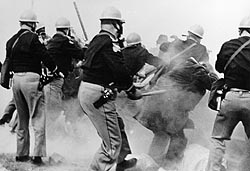
The first floor of the Alabama Department of Archives and History: A glass display case, filled with campaign paraphernalia from fifty years of Alabama electoral contests. There's a pamphlet for former governor John Patterson ("proven defender of our rights"). On one poster, "Big" Jim Folsom says a "new Alabama constitution is the answer." Former governor George Wallace could have a whole case to himself: buttons, magazine articles, pins, even a "souvenir album," showing Wallace and his wife Lurleen in front of a Confederate flag nearly overwhelm the other candidates.
It's colorful and eye-catching. It gives you a peek into what was flooding people's mailboxes 32, 36 and 40 years ago. They were probably x in a set of 20,000, the other 19,999 versions sent to a landfill a long time ago. The survivors seem curiously out of their time. Rarely do the items address the issues facing Alabamians, or allude to the struggles tearing them apart. They use simple slogans and simple assertions, blind, it seems, to the world outside.
In short, it's detritus, filled with attacks, simple thinking and deliberate avoidance of what's important. It's what we've seen in our mailboxes and on our televisions these last three months. It's what we hate about politics.
Then there's the second floor.
A group of people, dressed in attire appropriate for church, walk two-by-two down a road, protesting the shooting death of a man trying to protect his mother and grandfather. They are met at a bridge by armed employees of the state, who attack them with clubs and whips. And fire tear gas at them. All for their protest.
Forget, for a moment, what happened in the weeks following that confrontation. At the moment of the attack, the victims -- doing nothing more than registering their outrage at the conduct of the government -- had no recourse and no voice in the political process. State leaders did not depend on their vote and had no reason to listen to them. Those who would willingly and cheerfully do them physical harm had no need to fear prosecution by officials. A long and shameful history of prejudice and discrimination had robbed them of the vote -- and with it, the right to punish leaders who refused them government's most simple service of protection.
It has been said before, but the ballot does not, in itself, bring economic opportunity or freedom. It does not educate or uplift. All it does is protect people from coercion by their leaders, by giving them the chance to change leaders who would go against their will or their physical well-being. It makes them stockholders in the great enterprise of a government. And it requires others to respect them.
The first floor is what we hate. The second is why we must.

No comments:
Post a Comment